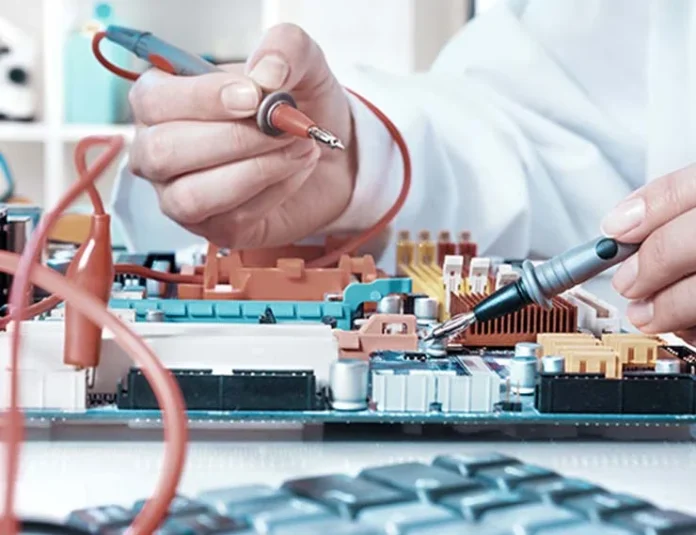India’s Electronic System Design and Manufacturing (ESDM) industry, one of the largest in the world in terms of consumption, reported at US$ 90 billion relied on 65-70 per cent of imports (https://www.thehindubusinessline.com/news/electronics-manufacturing-gears-up-for-change-but-skill-gap-remains/article6861498.ece). Interestingly, the electronics hardware production in India stood at US$ 63.39 billion in 2021 while the Indian Appliances and Consumer Electronics (ACE) industry stood at US$ 9.84 billion in 2021, which is expected to double to reach Rs 1.48 lakh crore (US$ 21.18 billion) by 2025 (https://www.ibef.org/industry/consumer-durables-presentation).
Rajeev Chandrasekhar, Union Minister of State for Electronics and Information Technology, said last month that India can achieve the target of US$ 300 billion worth of electronics manufacturing and exports by 2025-2026. At the same time according to Anil Agarwal, Chairman of Vedanta group, “we still import 94 per cent electronics to meet domestic requirements, the basic raw material for which is semiconductors and display glass; India imports both the semiconductors and display glass, spending about US$ 16 billion on these items.”
The capacity for manufacturing chips in India has been lacking primarily because of a lack of focus. India built the ‘Semiconductor Complex Ltd’ (SCL) in Chandigarh in the 1980s but it never took off. In the early 2000s, India wanted to purchase a semiconductor fabrication plant from South Korea but China got the whiff of it and bought it at a higher price. However, the Indian private industry has been making some efforts towards chip manufacturing.
Cosmic Circuits was an Indian company that developed, licensed and marketed differentiated analog and mixed-signal Semiconductor IP cores for use on System-on-Chips. The company got acquired by Cadence Designs Systems in May 2013. Cosmic Circuits was a winner of the 2007 Red-Herring Asia top-100 award. Cadence is running Electronic Design Automation (EDA) platforms as part of university programmes to train design-aware manpower for the ESDM industry. Over 350 engineering institutes are currently training their Very Large-scale Integration (VLSI) students on Cadence (https://www.thehindubusinessline.com/news/electronics-manufacturing-gears-up-for-change-but-skill-gap-remains/article6861498.ece).
India can achieve the target of $ 300 billion worth of electronics manufacturing and exports by 2025-2026, says Union Minister of State for Electronics and Information Technology Rajeev Chandrasekhar
Another company is the Bengaluru-headquartered semiconductor firm ‘MYMO Wireless Technologies Pvt Ltd’ established in 2009, which manufactures 4G and 5G technology and LTE chipsets ranging from IoT-M2M to military-specific products. The IPR of MYMO is worth more than US$ 100 million.
The ‘India Electronics & Semiconductor Association’ (IESA), the trade body representing the Indian ESDM industry, is devoted to promoting the development of semiconductors. To build a talent pipeline, IESA has signed memorandums of understanding (MoUs) with the Electronics Sector Skills Council of India, Visvesvaraya Technological University and RV-VLSI Design Centre.
In addition, is the not-for-profit professional body serving the semiconductor community for about four decades – ‘Semiconductor Society (India) functional over the past four decades with more than 700 members. It provides a platform for interaction in the field of semiconductor materials and devices.
Presently, India doesn’t have any fabs, or semiconductor fabrication plants, which manufacture chips. However, the government is seriously wooing foreign chipmakers through a US$ 10 billion incentive scheme for semiconductor companies. According to news reports of May 2022, the International semiconductor consortium ISMC has said it would invest $ 3 billion in a semiconductor chip-making plant in Karnataka. ISMC is a joint venture between Abu Dhabi-based ‘Next Orbit Ventures’ and Israel’s ‘Tower Semiconductor’.
More recently, news has emerged that in an initial US$ 10 billion investment, India’s ‘Vedanta’ and Taiwan’s ‘Foxconn’ will be setting up a semiconductor production plant, a display fab unit, and a semiconductor assembling and testing unit in a 60-40 joint venture (JV) on a 1000-acre plot in Ahmedabad, Gujarat. Chern-Chyi Chen, deputy minister in Taiwan’s economic affairs ministry, is leading a 70-member delegation to India this week. Among the discussion, the Vedanta-Foxconn JV will naturally be discussed.
The meeting of the deputy economic ministers is hosted alternatively by India and Taiwan. India-Taiwan relations have been on the upswing. Some 130 Taiwanese companies have set up factories in India. Moreover, Taiwan has established 24 Taiwan Education Centers pan India which also teach Mandarin. India-Taiwan bilateral trade in 2021 was US$7.7 billion – a 64 per cent increase over 2020.
India does not have any fabs, or semiconductor fabrication plants, which manufacture chips. However, the government is seriously wooing foreign chipmakers through a US$ 10 billion incentive scheme for semiconductor companies
Currently, the US makes 12 per cent of semiconductors in the world. China exported chips worth US$ 120 billion in 2021 whereas its imports cost more than $ 400 billion. The ‘Taiwan Semiconductor Manufacturing Company’ (TSMC), makes 90 per cent of sophisticated cutting-edge chips. India appears to be taking steps to double down on Chinese smartphones but we have a long way to go. For example, JIO mobile phones are still using Chinese batteries though some other parts are now being imported from Vietnam instead of China as earlier.
The recent US sanctions against China are to throttle China’s semiconductor industry, bar China from importing related material and in turn retard China’s economic growth. But these sanctions would also hit American companies like Apple plus bar individuals (including US citizens, green card holders, and foreign nationals who live in the US) to support the development, or production, of ICs at China-based advanced semiconductor manufacturing fabs without a license.
Concurrently, China has accelerated self-reliance in chip manufacturing. Chinese firm SMIC is already producing the 7nm MinerVa Bitcoin mining chip which serves China’s advanced product companies not supported by Taiwanese and South Korean companies anymore on America’s bidding. SMIC was earlier making 14nm chips but now has advanced its production technology by two generations, defying US sanctions intended to halt the rise of China’s largest chipmaker (https://www.cnbctv18.com/technology/china-top-chipmaker-smic-achieves-breakthrough-despite-us-curbs-14214522.htm). In September 2022, SMIC broke ground on a $ 7.5 billion electronic fabrication plant in the port city of Tianjin. There is also speculation that China will be able to bypass US sanctions like all other sanctions.
Semiconductors are an essential component of electronic devices, enabling advances in communications, computing, healthcare, military systems, transportation, clean energy, and countless other applications
The Indian Government has made an excellent move in the production of semiconductors under ‘Make in India’. Semiconductors are an essential component of electronic devices, enabling advances in communications, computing, healthcare, military systems, transportation, clean energy, and countless other applications. The name of the game should be speed and establishment of chip manufacturing facilities across India, including in the two Defence Industrial Corridors being developed in Uttar Pradesh and Tamil Nadu. The overall plan should bear the following in mind:
- It would be prudent to invite multiple foreign semiconductor companies/conglomerates from different counties to ensure diversification.
- South Korea’s ‘Samsung’ reportedly plans to invest US$ 200 billion in new chip factories.
- Taiwan is among the best partners India has for the joint production of semiconductors. But Taiwan is in the crosshairs of China. China’s third-term President Xi Jinping would want to integrate Taiwan into mainland China at the earliest, together with Taiwan’s chip industry. But given Xi Jinping’s evil personality, he could attack and destroy Taiwan’s chip industry to achieve integration, once China attains a certain level of self-sufficiency in semiconductor production, or even without it since Taiwan and South Korea are not supporting Chinese companies in this count.
- Our finance minister has invited the US also to invest in India for chip manufacturing. But the US demonstratively is an extremely unreliable partner who uses and throws away countries. It can subject India to sanctions similar to China depending on the whims and fancies of America’s deep state which would never want a strong India.
Finally, joint ventures with foreign entities are fine to begin with but given that semiconductors in a way are the nerve centre of any nation, India must aim for self-sufficiency in chip manufacturing in the interest of our economic growth, national security and global standing. The benefit of exporting chips would be automatic.
-The author is an Indian Army veteran. Views expressed are personal.
The author is an Indian Army veteran. The views expressed are of the author and do not necessarily reflect the views of Raksha Anirveda






